The recent editorial on redistricting has brought to light the often-overlooked consequences of gerrymandering on the democratic process. Gerrymandering, the practice of manipulating electoral district boundaries for political gain, has been a longstanding issue in the United States. The effects of gerrymandering are far-reaching, influencing not only the outcome of elections but also the representation of voters. When district boundaries are drawn to favor one party over another, it can lead to a disproportionate number of seats being held by that party, despite the popular vote. This can result in a lack of representation for certain groups, including minorities and those with differing political views. Furthermore, gerrymandering can lead to a lack of competition in elections, as incumbents are often safely entrenched in their districts. This can lead to a lack of accountability and a sense of complacency among elected officials. The editorial highlights the need for redistricting reform, citing the importance of fair and competitive elections. One potential solution is the implementation of independent redistricting commissions, which would remove the process from the hands of partisan politicians. Another approach is the use of algorithmic tools to draw district boundaries, which could help to reduce the influence of politics and increase the fairness of the process. Despite these potential solutions, the issue of gerrymandering remains a complex and contentious one. The Supreme Court has weighed in on the issue, ruling that partisan gerrymandering is not necessarily unconstitutional. However, this ruling has been met with criticism from many, who argue that it does not go far enough in addressing the issue. The impact of gerrymandering is not limited to the federal level, as it also affects state and local elections. In many cases, gerrymandering has been used to suppress the votes of certain groups, including African Americans and Hispanics. This can have long-lasting consequences, including a lack of representation and a sense of disenfranchisement among these groups. The editorial concludes by emphasizing the need for voters to be aware of the issue of gerrymandering and to demand reform from their elected officials. By working together, it is possible to create a more fair and representative democratic system. The issue of gerrymandering is not unique to the United States, as many countries around the world struggle with similar issues. However, the United States has a unique system of government, which can make it particularly vulnerable to the effects of gerrymandering. The editorial serves as a call to action, urging voters to take an active role in demanding reform and promoting a more fair and representative democratic system. Ultimately, the issue of gerrymandering is one that requires a comprehensive and multifaceted approach, involving not only elected officials but also voters and advocacy groups. By working together, it is possible to create a more just and equitable democratic system, where every vote counts and every voice is heard. The need for redistricting reform is clear, and it is up to voters to demand action from their elected officials. The consequences of inaction could be severe, including a continued lack of representation and a sense of disenfranchisement among certain groups. However, by taking action and demanding reform, voters can help to create a more fair and representative democratic system, where every voice is heard and every vote counts.
